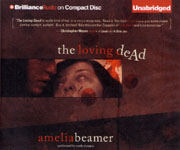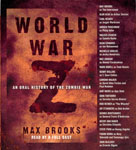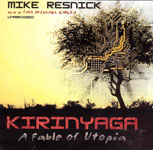
 The Loving Dead
The Loving Dead
By Amelia Beamer; Read by Emily Durante
7 CDs or 1 MP3-CD – Approx. 8 Hours [UNABRIDGED]
Publisher: Brilliance Audio
Published: July 2010
ISBN: 9781441868343 (cd), 9781441868367 (mp3-cd)
Themes: / Horror / Zombies / Sex / Airships / Humor / San Fransisco / California /
Kate and Michael, twenty-something housemates working at the same Trader Joe’s supermarket, are thoroughly screwed when people start turning into zombies at their house party in the Oakland hills. The zombie plague is a sexually transmitted disease, turning its victims into shambling, horny, voracious killers. Thrust into extremes by the unfolding tragedy, Kate and Michael are forced to confront the decisions they’ve made, and their fears of commitment, while trying to stay alive. Michael convinces Kate to meet him in the one place in the Bay Area that’s likely to be safe and secure from the zombie hordes: Alcatraz. But can they stay human long enough?
Beamer creates scenes, and cuts adequately between them, but when confronted by the surrealistic circumstances she provides (like being trapped in a Zeppelin bathroom with two lesbian zombies) her characters seem more like emotional marionettes, than like real people. It’s almost as if Beamer was actually role-playing a series of improvised scenarios, rather than plotting it out like a novel. When one of the characters discovers that these zombies respond to the crack of a whip, for example, Kate downloads an “Indiana Jones App” to her iPhone and subdues them with it. Clever? Sure. Novelistic? Notsomuch. Thus the tension of a zombie confrontation – will she or won’t she be able to get 3G service high above Oakland – isn’t very satisfying.
Shortly after this audiobook arrived I listened to it’s author, Amelia Beamer, being interviewed on the SFSignal Podcast #006. She talked about how she found the relentlessness of zombies almost endearing. It was a neat idea. And then she said she intended it to be a romantic comedy with zombies. And that was enough to put it in my bathroom audiobook stack. So, for the last week or so I’ve been brushing and flossing my teeth to this novel. I didn’t go in expecting much other than zombies and loving and a few laughs. It has the first two. The loving is actually sex and the zombies are less dead and rotting than they are contagious and sex crazed. If you did a count you’d probably find as many individuated zombies as there are sex scenes. Come to think of it there were probably about just as many tattoos as there were sex scenes and zombies. Where this novel really doesn’t fulfill it’s promise is in the humor department. I didn’t laugh, or smile, or even smirk. Thinking about it, it wasn’t that there were jokes and they weren’t funny, but rather I that the humor was supposed to come from the absurd situational specifics and the slacker/poser cast’s bumbling their way through it all. It has relationships, and people thinking about their relationships, and it has some zombies but I didn’t find it funny.
Getting into specifics now – there’s something odd going on with the meta-Americanness, or rather some subset of it, within the novel’s characters and setting. Even though both Kate and Michael both pretty quickly recognize the infected as zombies, Beamer’s characters seem highly reticent to kill them. Instead they far prefer restraining their wrists, sitting on them – any form of bondage – as in, tie them up or tie them down. Yeah … well … okay. So, I have to think that, in combination with the whips, and the sex and all the tattoos, that taken as a whole this is not so much a zombie novel as a kind of contemporary fiction novel, set in a slacker BDSM San Fransisco subculture, with some zombie additions. Maybe that’s what I signed up for, but I was wrong to do so.
At first I liked some of the references to local stores and products. This is something that is done far too little in most fiction, as far as I’m concerned. It’s one of the things I like most about William Gibson’s prose, he has a reverence to specifics. But as it all went on in The Loving Dead, and as the characters repeatedly reminded each other that they’d read Max Brooks (World War Z |READ OUR REVIEW|), worked at Trader Joe’s or Whole Foods, it seemed like it wasn’t so much fun – instead it became increasingly clear that it was what was on their minds all the time. It seemed like the real zombies in this audiobook were the characters, living their quiet lives of desperate consumption, performing a narrative for themselves and expressing it in text messages. If I believed in a soul I’d call it a soul-numbing audiobook.
On the final disc we get a flash cut to ten years after the zombie apocalypse first hits. It’s an interesting experiment, to take a doomsday scenario way down the road and see what life is like in the aftermath. One of the redeeming features, of David Moody’s otherwise lackluster Hater |READ OUR REVIEW|, is also in The Loving Dead too. The author takes one significant aspect of a premise to it’s logical and (hopefully inevitable) conclusion. As such, it has some novelty value if only for that. For some true vanilla zombie goodness I’ll get back to reading Robert Kirkman’s The Walking Dead.
Narrator Emily Durante, a new voice to my ears, is a good reader, I can see that, even despite my not loving The Loving Dead, she provided a steady voice to a patchy and punctuated narrative.
Posted by Jesse Willis




